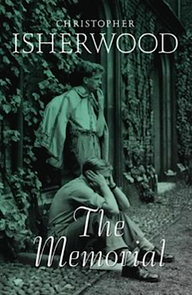A WRITER'S WIT |
My Book World

Isherwood’s second novel is not a comfortable or cozy read. He is a bright, young author attempting to impress the literary world with perhaps a Modernist book, one like his heroes, E. M. Forster and Virginia Woolf, write. This novel, as the title would suggest, revolves, at first, around the World War I memorial that one English town erects to honor its own 130 fallen men, including one Richard Vernon. But the narrative is so much more: it tells the story of his surviving widow, Lily Vernon, her son, Eric, a host of other relatives, and a man, a friend of the late Mr. Vernon, who, as it turns out, is a homosexual. By novel’s end this man, Edward Blake, is living in pre-Nazi Berlin with a young man named Franz—perhaps heralding Isherwood’s courage to write more about gay life in his The Berlin Stories, which is to follow in 1934.
Isherwood, who later works in Hollywood as a screenwriter, writes here as if he is unreeling a film, endeavoring to tell his narrative without the aid of authorial explanation. For example, the four major parts shift from 1928, to 1920, to 1925, then back to 1929. Chapters unfold by way of various characters’ points of view, sometimes, from person to person, within a single chapter. If you wish to know who is related to whom you must pay careful attention; you rarely see such words as “cousin,” “aunt,” or “uncle.” Moreover, certain symbols or motifs are sounded in the background, like distant chimes: clocks of all kinds, some that tick loudly, some that stop entirely; conservative people who pine for the past; rituals of how life has unfolded before the war. One way Isherwood mitigates the distance that he may create with his disjointed threads is that he is particularly adept in portraying the inner lives of his characters, without telling too much. Here, Eric Vernon contemplates his Aunt Mary juxtaposed with his mother:
“And yet, here he was thinking about going to tea at Aunt Mary’s. He had another pang of guilt at his selfishness. It was curious that the thought of Aunt Mary often made him feel guilty towards his mother, apparently without any reason” (154).

Date of Original Post:
11/13/14 — Introduction to My Long-Playing Records
11/20/14 — "My Long-Playing Records" — The Story
11/27/14 — "A Certain Kind of Mischief"
12/04/14 — "Ghost Riders"
12/11/14 — "The Best Mud"
12/18/14 — "Handy to Some"
12/25/14 — "Blight"
01/01/15 — "A Gambler's Debt"
01/09/15 — "Tales of the Millerettes"
01/15/15 — "Men at Sea"
01/22/15 — "Basketball Is Not a Drug"
01/29/15 — "Engineer"
02/05/15 — "Snarked"
02/12/15 — "Killing Lorenzo"
02/19/15 — "The Age I Am Now"
02/26/15 — "Bathed in Pink"
Listen to My Long-Playing Records Podcasts:
03/12/15 — "A Certain Kind of Mischief"
03/26/15 — "The Best Mud"
04/02/15 — "Handy to Some"
04/09/15 — "Tales of the Millerettes"
04/16/15 — "Men at Sea"
04/23/15 — "My Long-Playing Records"
04/30/15 — "Basketball Is Not a Drug"
05/07/15 — "Snarked"
05/21/15 — "Killing Lorenzo"
05/28/15 — "Bathed in Pink"
Also available on iTunes. Watch for more podcasts!


 RSS Feed
RSS Feed